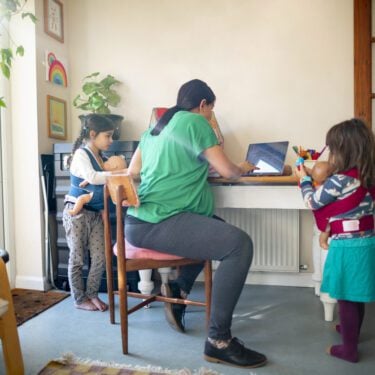
21/07/22
3 min read
Innovation is at the heart of plans to reform adult social care across the four UK nations. Nuffield Foundation POST Fellow, Katherine Davis explains that conversations with people who have experience of adult social care are vital to effective innovation.
In 2022, adult social care is at a crossroad. The sector aims to support adults living with physical disabilities, learning disabilities, and physical and mental health conditions so that they can lead a fulfilling life. This aim can be achieved in many ways, from provision of advice to giving nursing care. However, substantial challenges to high quality support are being posed by rising demand, staffing difficulties and financial constraints. This has led to calls for a change of direction from people who draw on care and support, regulators, care providers and others.
In response, governments in England, Scotland, Wales and Northern Ireland have set out plans to develop a more innovative adult social care sector. Within this context, innovation has been very broadly defined as changes to practice that solve a problem. Examples include technological innovation, as well as innovation in policy, service delivery and commissioning.
I recently wrote a POSTnote briefing on Innovation in adult social care. The briefing identified a range of projects and organisations already working to make the sector more innovative. These pioneers show how we can change the story around adult social care – moving from negative headlines to positive practical improvements.
Midlothian care co-ordination team
The Midlothian care co-ordination team are an exciting demonstration of how changes to the workforce can foster innovation. The team focus on staff training and development, as well as introducing ‘distributed leadership’ that encourages staff to take responsibility and to adjust their practice. This has been vital to the effective delivery of the team’s trailblazing single point of access approach to dementia services. The team’s success highlights how an empowering leadership style and support for staff development could be routes to a more innovative adult social care sector.
DACHA study
The DACHA study showcases a different route to greater innovation. The study aims to develop a consistent approach to the way care homes produce and manage their data. Care homes currently have lots of separate datasets. These datasets are not well connected or easy to access, which makes it hard to identify problems that could be targeted for innovation. In response, DACHA researchers will pull together these various datasets in a format that is valuable for a range of users. In an era of data-driven research and development, the DACHA study underscores the value of joining up data across the sector.
Social Care Digital Innovation Programme
Funding may also be an important component of plans to increase innovation. Between 2017 and 2021, NHS Digital and the Local Government Authority (LGA) provided grant funding through the Social Care Digital Innovation Programme. As a result, 49 local authorities invested in digital transformation. Projects were funded to raise awareness of robots that help with lifting people, develop analysis tools for local authorities and prototype specialist apps. Many of the projects demonstrated positive outcomes and received follow-on funding. Outcomes included increased satisfaction among people who draw on care and support and reduced hospital admissions. In a sector that faces financial constraints, targeted investment could be another route to increased innovation.
The Social Care Innovation Network
Adult social care can be fragmented, with organisations and individuals unaware of practice elsewhere. To change this, the Social Care Institute for Excellence, Think Local, Act Personal (TLAP) and Shared Lives Plus formed the Social Care Innovation Network. The network brought together people who draw on care and support, providers, local authorities and others for a series of discussions and events. Through a digital platform and face-to-face meetings, the network identified challenges to innovation in adult social care and created resources to allow innovators to overcome them. The Network demonstrates the value of building connections between organisations and individuals through networks, forums and other initiatives to boost innovation.
Where next?
The examples above highlight some key pathways to boosting innovation. Supporting the workforce, gathering data, funding change and connecting people could all lead to positive changes to practice and problem solving. These routes to greater innovation are not mutually exclusive and there may be a lot of potential to shift the way adult social care works. Nevertheless, it is important to recognise that none of these pathways will be accessible without input from people who draw on care and support, and the people who work in the sector.
When I was writing my POSTnote briefing, I was lucky to have an opportunity to meet people from across adult social care. They helped me to understand how adult social care works and how things might change. As policymakers chart a path towards a more innovative adult social care sector, continuing conversations with people who have experience of adult social care will be vital.
About the author
Katherine is a postgraduate researcher on the Wellcome Trust PhD Programme in Epidemiology, Evolution and Control of Infectious Diseases at Imperial College London. Her work focuses on the quality of life of people living with HIV in sub-Saharan Africa.
In 2022, Katherine paused her PhD research to complete a three-month Fellowship in the Parliamentary Office for Science and Technology (POST), funded by the Nuffield Foundation. During her Fellowship, Katherine researched and wrote a briefing on innovation in adult social care. The briefing aimed to provide a summary of the types of innovation in the adult social care sector in the UK, as well as evidence on key barriers to and facilitators of innovation, and lessons learned from the COVID-19 pandemic.














































